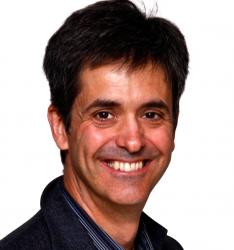 Elsewhere
Elsewhere
 Elsewhere
Elsewhere

Losing Weight: More Difficult Than Before
Canadian researchers at York (Toronto) and Alberta (Edmonton) universities have shown that it is harder to lose weight today than it was in 1971. They evaluated the information of a database (NHANES, National Health and Nutrition Survey), which covered 36,377 US adults between 1971 and 2008, on the basis of food, and 14,419 adults between 1988 and 2006, on the basis of physical activity. Their analysis, which was based on a statistical model, reveals that a person in 2008, who ate the same amount of calories than that of a similar person in 1971, weighed 10% more! (1)
What’s more, in a comment about this study from Toronto dietitian Leslie Beck, we learn that, according to a Statistics Canada survey (3), we actually consume fewer calories than our parents! (2) And yet …
Overweight and obesity rates continue to rise. Why is this?
The results of the study point us toward an explanation. In the United States, carbohydrate intake (the proportion in the diet) increased by 10-14%, but protein and fat intake decreased by 5-9%. So we see that the type of food has changed: more industrialized, more transformed. Like the researchers, Leslie Beck criticized the increasingly unnatural diet that plagues us today. It also draws our attention to other probable causes.
We live in a much more toxic environment than in the 1970s. Many chemical substances have appeared in our environment, and many of them act as hormonal disruptors (pesticides, food additives, cosmetics, flame retardants, etc.) . Constant exposure to these substances, from the mother’s womb up to old age, could reprogram our metabolism.
And that’s not all! Several drugs, such as antidepressants, have the side effect of weight gain, and the number of prescriptions of these drugs continues to increase.
Our frenetic lifestyle, the (often self-imposed) obligation to be constantly connected (cyberdependence) and the chronic lack of sleep (we sleep on average 1 hour less per night than 100 years ago), with the high rate of stress that follows, affects our secretion of cortisol (stress hormone) and can increase blood sugar levels and waist circumference.
I want to lose weight, but how?
If I tell you that losing weight happens through diet and exercise, you will tell me that this is nothing new. Which is true, but what you may not know is that you do not need to cut calories to lose weight. The way forward is to improve the quality of what we eat. Reduce additives and transformed foods and increase whole, natural foods and home cooking. We eat too many carbohydrates (sugars and starches) and not enough protein and good fats.
Next, there is physical activity. If we are more efficient than our parents at storing energy, then we must be more efficient in burning off the surpluses. The choice of the activity is up to you, but it is important to exercise enough to get hot, at least ½ hour a day, five times a week.
Lastly, since hormonal disruptors are part of the culprits, we must also deal with them: eat organic as much as possible, reduce your use of plastics in the kitchen, make good choices with your cosmetics, etc. And as they accumulate in the body, we have to find a way to get rid of them. Many people in the conventional health sciences are against detox products, but maybe we should be considering them a bit more. Certain plants, such as milk thistle, can help the body break down disrupting substances which helps the body to eliminate them.
In her article, Leslie Beck finishes with a word of wisdom: If you have a very good diet, are active and love life, it’s possible that your healthy weight may be higher than you believe it to be. In addition, some people are more sensitive to environmental factors and therefore have more problems controlling their weight. In short, be realistic in your weight goals and free yourself from the obsession with the scale. Life is too beautiful and too short to miss out on it because of a bulge or some extra pounds.
References:
- Brown RE, Sharma AM, Ardern CI, Mirdamadi P, Mirdamadi P, Kuk JL. Secular differences in the association between caloric intake, macronutrient intake, and physical activity with obesity. Obes Res Clin Pract. 2015 Sep 14. pii: S1871-403X(15)00121-0. doi: 10.1016/j.orcp.2015.08.007. [Epub ahead of print] PubMed PMID: 26383959. http://www.ncbi.nlm.nih.gov/pubmed/26383959
- Beck Leslie. Why losing weight today is harder than 30 years ago. https://www.linkedin.com/pulse/why-losing-weight-today-harder-than-30-years-ago-leslie-beck-rd
- Enquête sur la santé dans les collectivités canadiennes – Composante annuelle http://www23.statcan.gc.ca/imdb/p2SV_f.pl?Function=getSurvey&SDDS=3226
Author


 Canada
Canada  Alberta
Alberta  British Columbia
British Columbia  Manitoba
Manitoba
 New Brunswick
New Brunswick  Newfoundland Labrador
Newfoundland Labrador  Nova Scotia
Nova Scotia  Ontario
Ontario  Prince Edward Island
Prince Edward Island  Quebec
Quebec  Saskatchewan
Saskatchewan  United States
United States  Belgium
Belgium
 France
France  Italy
Italy  Switzerland
Switzerland 





Leave a Reply